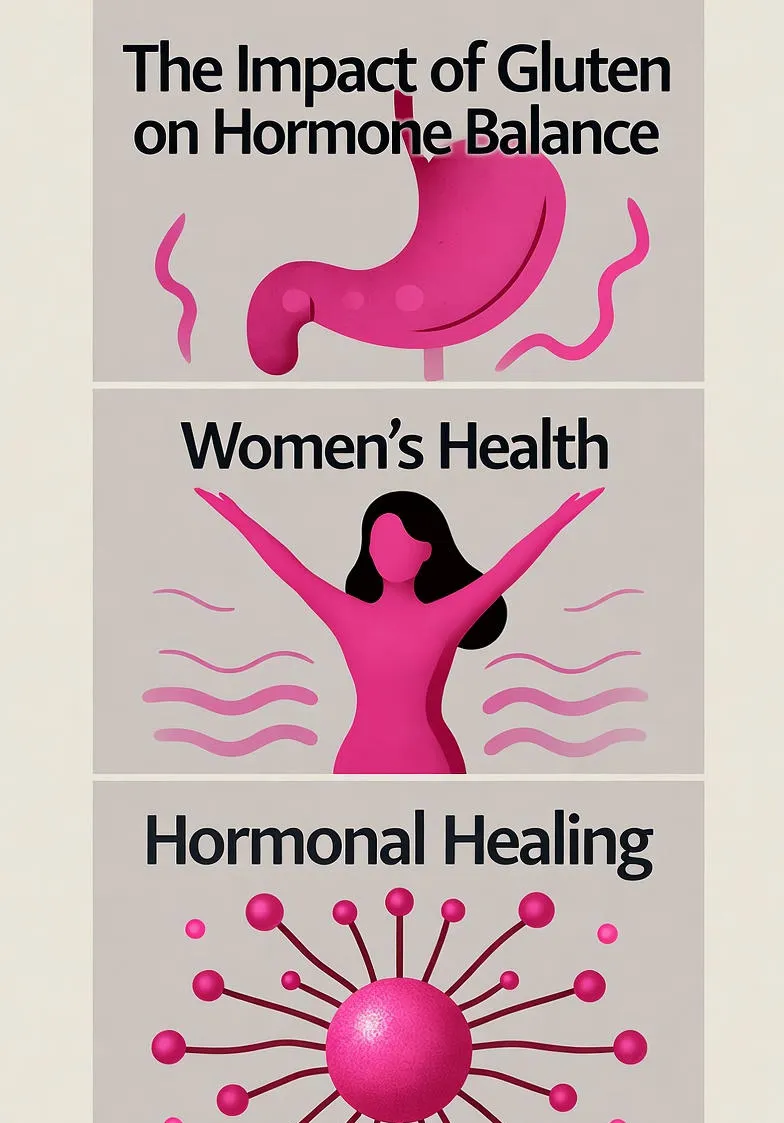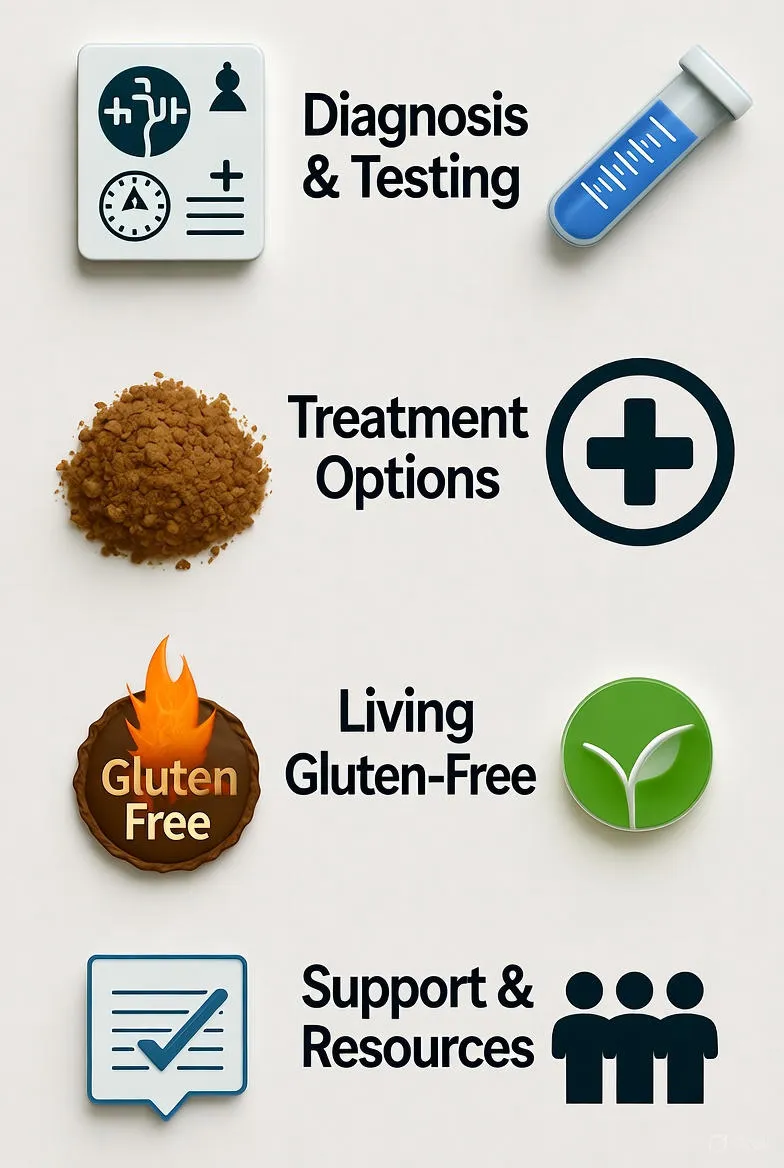The Hidden Link: How Gluten Disrupts Hormone Balance and What You Can Do
Uncover how gluten triggers inflammation leading to hormone imbalances in thyroid, estrogen, cortisol, and more. Discover symptoms, science, and gluten-free strategies for restoring balance.

Understanding the Gut-Hormone Axis
The human body is a symphony of interconnected systems, where what we eat plays a starring role in maintaining harmony. At the center of this orchestra is the gut, often called the 'second brain' for its profound influence on overall health. But when gluten enters the scene, this delicate balance can tip, particularly affecting hormone levels. Gluten, a protein found in wheat, barley, and rye, is a staple in modern diets, lurking in everything from bread to pasta. For many, it's harmless. For others, especially those with sensitivities or celiac disease, it triggers a cascade of inflammatory responses that ripple through the endocrine system.
Research highlights a compelling connection between gluten consumption and hormonal disruptions. Inflammation from gluten can impair nutrient absorption in the intestines, leading to deficiencies in key vitamins and minerals essential for hormone production. This gut-hormone axis is crucial: the gut microbiome influences how hormones are metabolized, and any disruption here can lead to imbalances in estrogen, progesterone, thyroid hormones, and cortisol. As we'll explore, these effects are especially pronounced in women, where hormonal fluctuations already play a significant role in daily well-being.
Gluten's Inflammatory Assault on the Body
To grasp gluten's impact, we must first understand its journey through the digestive tract. In susceptible individuals, gluten proteins like gliadin resist complete breakdown, prompting the immune system to mount an attack. This results in leaky gut syndrome, where intestinal barriers become permeable, allowing toxins and undigested particles to enter the bloodstream. The ensuing inflammation isn't localized—it's systemic, reaching organs responsible for hormone regulation.
Chronic inflammation elevates pro-inflammatory cytokines, molecules that interfere with hormone signaling pathways. For instance, they can suppress the hypothalamic-pituitary-adrenal (HPA) axis, which governs stress responses and cortisol release. Over time, this chronic state exhausts the adrenal glands, leading to fatigue and further hormonal dysregulation. Studies, including those from the National Institutes of Health, link this inflammatory response to autoimmune conditions like Hashimoto's thyroiditis, where gluten mimics thyroid tissue, exacerbating antibody production.
The Role of Zonulin and Gut Permeability
A key player in this process is zonulin, a protein that regulates tight junctions in the gut lining. Gluten triggers zonulin release, widening these junctions and promoting permeability. This 'leaky gut' allows gluten peptides to interact directly with the immune system, amplifying inflammation. The fallout? Impaired detoxification in the liver, where excess hormones like estrogen are normally processed. When this falters, estrogen dominance emerges, contributing to symptoms like PMS, fibroids, and mood swings.
Specific Hormones Under Siege
Thyroid Hormones: The Silent Saboteur
The thyroid gland, a butterfly-shaped organ in the neck, dictates metabolism, energy, and even reproductive health through hormones T3 and T4. Gluten sensitivity often coexists with thyroid autoimmunity. Molecular mimicry is at play here: gliadin's structure resembles thyroid proteins, fooling the immune system into attacking both. A pilot study published in the Journal of Clinical Endocrinology & Metabolism found that a gluten-free diet reduced thyroid antibodies in women with Hashimoto's, improving hormone levels within months.
Moreover, gluten-induced malabsorption deprives the thyroid of selenium and zinc, cofactors for hormone conversion. Without them, T4 fails to become active T3, leading to hypothyroidism symptoms: fatigue, weight gain, hair loss, and cold intolerance. Women over 40 are particularly vulnerable, as perimenopause compounds these issues.
Estrogen and Progesterone: Reproductive Ripples
For women's health, the estrogen-progesterone dance is vital for menstrual regularity and fertility. Gluten's interference manifests as elevated prolactin, a hormone that suppresses ovulation and milk production. Elevated levels, linked to gluten inflammation, cause irregular cycles, low libido, and even galactorrhea (inappropriate milk discharge). In polycystic ovary syndrome (PCOS), gluten worsens insulin resistance, spiking androgens that disrupt estrogen balance.
Progesterone, the calming counterpart to estrogen, suffers too. Inflammation diverts cholesterol—its building block—toward stress hormones, leaving progesterone production shortchanged. This imbalance fuels anxiety, insomnia, and infertility. Clinical observations from functional medicine practitioners note that eliminating gluten often restores ovulatory cycles within 3-6 months.
Cortisol and Adrenal Fatigue: The Stress Connection
Adrenal glands, perched atop the kidneys, release cortisol to manage stress. But gluten's gut assault signals constant danger, overactivating the HPA axis and causing cortisol spikes followed by crashes. This rollercoaster exhausts adrenals, leading to 'adrenal fatigue'—a term debated but descriptive of symptoms like chronic tiredness, sugar cravings, and weakened immunity.
Women in high-stress phases, like new motherhood or career peaks, feel this acutely. Gluten's blood sugar destabilization exacerbates it: refined wheat products cause insulin surges, prompting cortisol release to stabilize glucose. Over time, this cycle perpetuates hormonal chaos, linking to conditions like burnout and depression.
Insulin: The Metabolic Mediator
Beyond sex and stress hormones, insulin—the pancreas's glucose regulator—bears gluten's brunt. High-glycemic gluten foods provoke insulin spikes, fostering resistance over time. This not only promotes weight gain but also amplifies androgen production in ovaries, worsening PCOS. A gluten-free approach, rich in whole foods, sensitizes cells to insulin, stabilizing blood sugar and indirectly supporting other hormones.
Recognizing the Signs: Symptoms of Gluten-Induced Imbalance
Hormone disruptions whisper before they shout. Early signs include digestive woes—bloating, diarrhea, or constipation—stemming from gluten intolerance. Hormonally, watch for irregular periods, heavy bleeding, or amenorrhea. Mood instability, from irritability to unexplained tears, signals estrogen fluctuations. Physical cues like unexplained weight gain around the midsection (cortisol's hallmark) or thinning hair (thyroid red flag) demand attention.
Fatigue that coffee can't fix, brain fog, and sleep disturbances compound the issue. In severe cases, libido plummets, and fertility challenges arise. If these resonate, tracking symptoms alongside diet via a journal can reveal patterns. Blood tests for hormone panels, including TSH, free T3, estradiol, and cortisol, provide concrete data.
- Digestive Distress: Bloating, gas, abdominal pain post-wheat consumption.
- Menstrual Mayhem: Skipped cycles, severe cramps, or spotting.
- Mood Swings: Anxiety, depression, or emotional volatility.
- Energy Slumps: Midday crashes, reliance on stimulants.
- Skin and Hair Signals: Acne, dry skin, excessive shedding.
Evidence from the Lab: What Studies Say
Science backs the gluten-hormone nexus. A 2024 review in Nutrients journal analyzed how gluten-free diets mitigate thyroid autoimmunity, noting improved TPO antibody levels. Another study in the American Journal of Clinical Nutrition linked celiac disease to higher infertility rates, reversible post-diagnosis with gluten elimination.
For PCOS, a 2021 trial in Fertility and Sterility showed that gluten reduction lowered insulin and androgens, enhancing ovulation. Adrenal research from the Journal of Alternative and Complementary Medicine associates non-celiac gluten sensitivity with HPA dysregulation, advocating dietary intervention. While not universal—only 1% have celiac, 6% non-celiac sensitivity—these findings urge personalized approaches.
Critics note that correlation isn't causation; confounding factors like overall diet quality matter. Yet, the consensus: for symptomatic individuals, gluten abstinence yields hormonal harmony.
Embracing Gluten-Free: Hormonal Healing Pathways
Transitioning to gluten-free isn't deprivation—it's empowerment. Benefits unfold gradually: reduced inflammation eases gut healing, nutrient absorption improves, and hormones recalibrate. Women report lighter periods, sustained energy, clearer skin, and emotional steadiness. Thyroid function often normalizes, with TSH levels dropping and T3 rising.
Beyond symptom relief, long-term perks include lower autoimmune risk and better metabolic health. A 2023 cohort study in The Lancet Gastroenterology followed gluten-sensitive women; after one year gluten-free, 78% saw normalized hormone profiles versus 32% in controls.
Nutritional Nuances
Gluten-free doesn't mean junk food free. Prioritize whole grains like quinoa, nutrient-dense veggies, and healthy fats. Replenish B vitamins, lost in wheat fortification, via leafy greens and nuts. Omega-3s from fish counter inflammation, while adaptogens like ashwagandha support adrenals.
Practical Steps: Your Gluten-Free Roadmap
Start small: audit labels for hidden gluten in sauces, soups, and meds. Stock your pantry with almond flour, coconut yogurt, and rice pasta. Meal prep simplifies adherence—think overnight oats with gluten-free alternatives or stir-fries with tamari.
- Assess Sensitivity: Consult a doctor for celiac testing before cutting gluten, to avoid false negatives.
- Detox Gently: Phase out over weeks, incorporating bone broth for gut repair.
- Monitor Progress: Retest hormones at 3 and 6 months.
- Seek Support: Join communities or work with a nutritionist.
- Lifestyle Synergy: Pair with stress management, sleep hygiene, and exercise.
Challenges like cross-contamination or social dining are real, but resources abound. Apps like Find Me Gluten Free scan for safe eats, turning potential pitfalls into adventures.
Conclusion: Reclaim Your Hormonal Harmony
Gluten's shadow on hormone balance underscores diet's power in health orchestration. By addressing sensitivities, we not only soothe the gut but symphony-conduct our endocrine ensemble toward vitality. If gluten whispers discord in your body, listen—and choose freedom. Consult professionals for tailored advice, but remember: small dietary shifts can compose a life of balanced, vibrant health.
This exploration, drawn from emerging research and clinical insights, invites you to tune into your body's cues. Your hormones thank you for the consideration.


